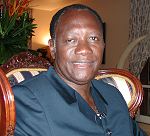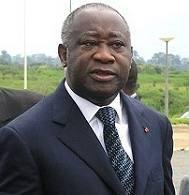
The United Nations Operation in Côte d'Ivoire(UNOCI)(French: Opération des Nations Unies en Côte d'Ivoire, ONUCI) was a peacekeeping mission whose objective was "to facilitate the implementation by the Ivorian parties of the peace agreement signed by them in January 2003". The two main Ivorian parties here are the Ivorian Government forces who control the south of the country, and the New Forces, who control the north. The UNOCI mission aims to control a "zone of confidence" across the centre of the country separating the two parties. The Head of Mission and Special Representative of the Secretary-General is Aïchatou Mindaoudou Souleymane from Niger. She has succeeded Bert Koenders from the Netherlands in 2013 who himself succeeded Choi Young-jin from South Korea in 2011. The mission officially ended on 30 June 2017.

Presidential elections were held in Ivory Coast in 2010. The first round was held on 31 October, and a second round, in which President Laurent Gbagbo faced opposition leader Alassane Ouattara, was held on 28 November 2010. Originally scheduled to be held in 2005, the vote was delayed several times due to the Ivorian Civil War and difficulties involved in the organization and preparation of the elections. A peace agreement between the government and the former rebel New Forces was signed on 4 March 2007, and in late April 2009, it was announced that the elections would be held by 6 December 2009, and that the date would be announced shortly. On 15 May 2009, the date was announced to be 29 November 2009. On 11 November, the elections were postponed again due to delays in the electoral roll. It was announced on 3 December 2009 to be held in late February or early March 2010.

United Nations Security Council Resolution 1924, adopted unanimously on May 27, 2010, after reaffirming resolutions 1893 (2009) and 1911 (2010) on the situation in Côte d'Ivoire and Resolution 1885 (2009) on Liberia, the Council extended the mandate of the United Nations Operation in Côte d'Ivoire (UNOCI) until June 30, 2010, pending further recommendations for its revision.

United Nations Security Council Resolution 1933, adopted unanimously on June 30, 2010, after reaffirming resolutions 1893 (2009), 1911 (2010) and 1924 (2010) on the situation in Côte d'Ivoire and Resolution 1885 (2009) on the situation in Liberia, the Council extended the mandate of the United Nations Operation in Côte d'Ivoire (UNOCI) and supporting French forces until December 31, 2010 and expanded UNOCI's mandate with provisions to strengthen its capacity to consolidate stability in the country.

United Nations Security Council resolution 1528, adopted unanimously on 27 February 2004, after recalling resolutions 1464 (2003), 1479 (2003), 1498 (2003), 1514 (2003) and 1527 (2004) on the situation in Côte d'Ivoire, the Council established the United Nations Operation in Côte d'Ivoire (UNOCI) for an initial period of twelve months.

United Nations Security Council Resolution 1946, adopted unanimously on October 15, 2010, after recalling previous resolutions on the situation in Côte d'Ivoire, including resolutions 1880 (2009), 1893 (2009), 1911 (2010) and 1933 (2010), the Council extended sanctions against the country, including an arms embargo and ban on the trading of diamonds, for a further six months.

United Nations Security Council Resolution 1962, adopted unanimously on December 20, 2010, after recalling previous resolutions on the situation in Côte d'Ivoire, including resolutions 1893 (2009), 1911 (2010), 1924 (2010), 1933 (2010), 1942 (2010), 1946 (2010) and 1951 (2010), the Council extended the mandate of the United Nations Operation in Côte d'Ivoire (UNOCI) until June 30, 2011 and urged all Ivorian parties to respect the outcome of the presidential election and the recognition of Alassane Ouattara as President.

United Nations Security Council Resolution 1967, adopted unanimously on January 19, 2011, after recalling previous resolutions on the situation in Côte d'Ivoire, including resolutions 1933 (2010), 1942 (2010), 1946 (2010), 1951 (2010) and 1962 (2010), the Council increased the number of forces in the United Nations Operation in Côte d'Ivoire (UNOCI) by 2,000. It was the first Security Council resolution adopted in 2011.

United Nations Security Council resolution 1603, adopted unanimously on 3 June 2005, after recalling previous resolutions on the situation in Côte d'Ivoire, the Council extended the mandate of the United Nations Operation in Côte d'Ivoire (UNOCI) until 24 June 2005.

United Nations Security Council Resolution 1609, adopted unanimously on 24 June 2005, after recalling previous resolutions on the situation in Côte d'Ivoire, the Council extended the mandate of the United Nations Operation in Côte d'Ivoire (UNOCI) and supporting French forces for a further seven months until 24 January 2006.

United Nations Security Council Resolution 1652, adopted unanimously on January 24, 2006, after recalling previous resolutions on the situation in Côte d'Ivoire, the Council extended the mandate of the United Nations Operation in Côte d'Ivoire (UNOCI) and supporting French forces until December 15, 2006. It was the first of 86 Security Council resolutions adopted in 2006, and the first of eight relating to the situation in Côte d'Ivoire.

United Nations Security Council Resolution 1721, adopted unanimously on November 1, 2006, after recalling previous resolutions on the situation in Côte d'Ivoire, the Council extended the transitional mandates of President Laurent Gbagbo and Prime Minister Charles Konan Banny for no more than a year.

United Nations Security Council Resolution 2000, adopted unanimously on July 27, 2011, after recalling previous resolutions on the situation in Côte d'Ivoire, including resolutions 1933 (2010), 1942 (2010), 1951 (2010), 1962 (2010), 1967 (2011), 1968 (2011), 1975 (2011), 1980 (2011), 1981 (2011) and 1992 (2011), and Resolution 1938 (2010) on the situation in Liberia, the Council extended the mandate of the United Nations Operation in Côte d'Ivoire (UNOCI) until July 31, 2012.
United Nations Security Council Resolution 1880 was unanimously adopted on 30 July 2009.
United Nations Security Council Resolution 1842 was unanimously adopted on 29 October 2008.
United Nations Security Council Resolution 1893 was unanimously adopted on 29 October 2009.
United Nations Security Council Resolution 1826 was unanimously adopted on 29 July 2008.















